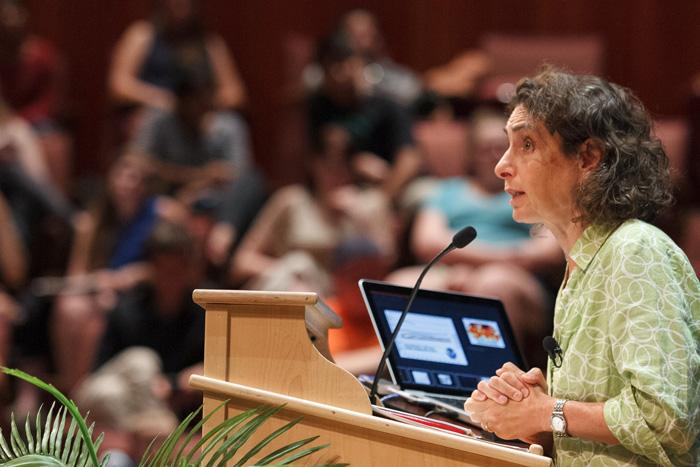Kolbert Recipient of Environmental Acitivism Award
Photo Courtesy of Dickinson Website
Elizabeth Kolbert speaks in front of an ATS audience of nearly 300 attendees about her book, The Sixth Extinction.
Elizabeth Kolbert, the 2016 winner of The Sam Rose ’58 and Julie Walters Prize at Dickinson College for Global Environmental Activism, spoke Tuesday about her recent book The Sixth Extinction.
Although Kolbert has received copious other awards in the past, including a Pulitzer prize in 2015, she described winning this award as, “an incredible honor following real heroes like Bill McKibben and Mark Ruffalo.” Recipients of The Sam Rose ’58 and Julie Walters Prize also receive $100,000.
Before accepting her prize and giving a speech on Tuesday, Kolbert spent two days visiting six classes and over 160 students, according to the Dickinson website. Assistant Professor of Environmental Science Kristin Strock, who hosted Kolbert in one of her classes, summarized the experience with kindhearted words: “After her talk tonight, after having her in class I am excited about the conversations I’ve been hearing throughout the students and faculty about the topics she presented. I hope we will continue to discuss and explore these topics after her stay here is finished.”
On Tuesday night more than 300 people were in attendance at ATS to listen to Kolbert speak. Through humorous storytelling, Kolbert highlighted three main areas in which humans are driving the Sixth Extinction event: the atmosphere, the ocean and the transportation of species throughout the globe.
The burning of fossil fuels has dramatically increased in the past few decades. Kolbert describes carbon burning as “reversing a process that took hundreds of millions of years in mere decades.” She says that this process releases increasingly large amounts of irreplaceable carbon into the atmosphere.
Using samples from ice cores, scientists including Kolbert have been able to analyze and record annual temperatures and atmospheres. This data, gathered from areas in Antarctica, dates back to 800,000 years ago. Until very recently the level of carbon dioxide (CO2) parts per million (ppm) had been under 300. However, these levels are now in excess of 800 ppm and are only increasing.
The increasing CO2 has a direct impact on all life on earth, says Kolbert. She explained that last year was the warmest year on record in 800,000 years, and this year has already broken those records. She attributed this to increased atmospheric carbon dioxide molecules caused by excess human use of fossil fuels.
Human impact has touched oceans as well, through a process called ocean acidification. As Kolbert described, “when carbon dioxide is released into the atmosphere lots of it ends up in the ocean.” Oceans have absorbed roughly a third of the carbon dioxide emitted since the industrial revolution, says Kolbert. This number is equal to about 150 billion metric tons.
Kolbert explains further that, when CO2 mixes with water it turns into a weak acid, large enough quantities of which will change the acidity of the ocean. This in turn can change entire aquatic environments. Kolbert displayed pictures from a study she completed of the water around Naples, Italy. The first from a normal environment vibrant with life, the second of an area affected by “natural acidification.” This habitat lacked everything the previous one had. Kolbert used this comparison to illustrate the direction in which ocean life is headed.
Finally Kolbert discussed the movement of species around the world. Using the island of New Zealand as an example, Kolbert recounted the destruction of the native species, and the disastrous introduction of alien species to the environment. This process is one that is occurring throughout the world.
Although Elizabeth Kolbert ended her presentation without providing answers to these problems, she concluded her speech with encouraging words stating that this extinction event “is not because we are viscous and indifferent, as the showing tonight shows otherwise.”






